
2022 Excellence Awards Finalists
Congratulations to the Finalists in the Engagement Australia 2022 Excellence Awards.
These Awards identify and celebrate the most exciting engagement activities undertaken by universities that demonstrate far-reaching impact and innovation in the Australian and New Zealand economy and community.
The Awards Judging Panel have commented on the exceptional quality of the submissions received this year.
Celebrate with us as we announce the winners of our annual Excellence Awards for Engagement, recognising the most impactful and purpose-driven engagement leaders across Australia and New Zealand. Monday 21 November, 6.30pm – 9.30pm
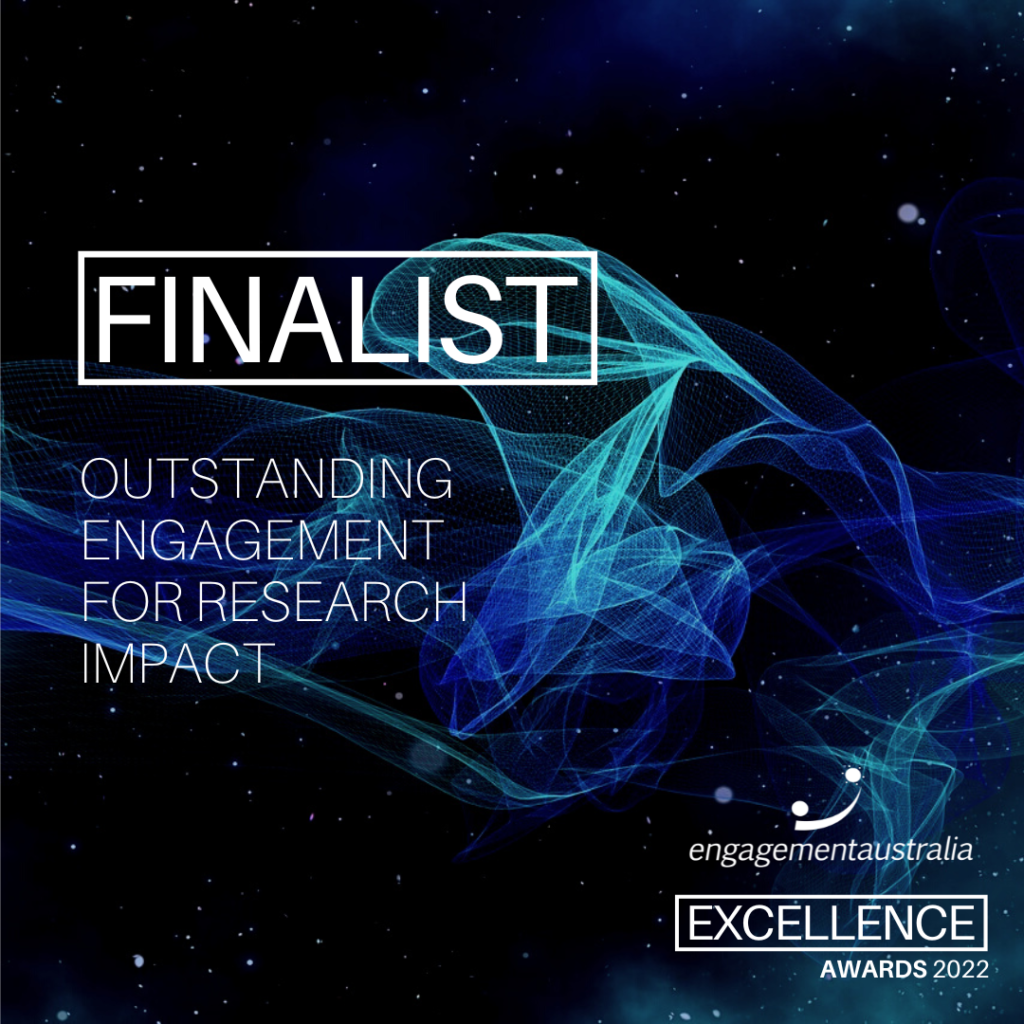
Quality in Acute Stroke Care (QASC) Program, Australian Catholic University
Reducing death and dependency: Transforming stroke care clinical practice through nurse-led intervention
Fever, elevated blood sugar levels, and swallowing difficulties are common after acute stroke and result in higher rates of death and disability. The Fever, Sugar, Swallow (FeSS) Protocols were developed through the Quality in Acute Stroke Care (QASC) Program to manage these complications in the first 72 hours of hospitalisation following stroke. Support to introduce the FeSS Protocols led to reduced death and dependency. Subsequent collaborative projects have resulted in changes to health policy, clinical practice guidelines, and adoption of the protocols nationally and internationally.
Predictive Analytics for Water Industry, University of Technology Sydney
To make use emerging data analytics techniques, UTS Data Science Institute and water industrial are collaboratively developing a data-driven integrated management solution for water supply &sewerage network proactive maintenance. For water supply networks, we have developed an advanced prediction model to detect failures and identify failure locations for water pipes and have construct the data-driven model for total chlorine prediction to improve the overall water quality management for the water delivery system. While for sewerage networks, a data-driven model has been developed to estimate the spatio-temporal distributions of H2S and sewer corrosion levels with sparse monitoring sites.
Transforming schooling through Quality Teaching Rounds, The University of Newcastle
The Teachers and Teaching Research Centre at the University of Newcastle has engaged with the NSW Department of Education in a unique program of research and development spanning 20 years and produced an innovative scalable approach to teacher professional development – Quality Teaching Rounds (QTR) – that has delivered striking benefits to schools, teachers, and students.
In recognition of these results, the Paul Ramsay Foundation provided $17.2 million to scale QTR nationally. The program has reached over 3,500 teachers, enriched understanding of quality teaching, transformed teaching practice and delivered significant improvement in student achievement, including in schools that serve disadvantaged communities.
Health and Wellbeing through Biophilic Design for Mental Health, Alcohol and Other Drugs (MHAOD) Facilities in Barwon Health, Deakin University
A Biophilic Design Framework has been developed and applied to inform design and construction of new Mental Health, Alcohol and Other Drugs (MHAOD) facilities in Barwon Health, that enhance and support the mental health and wellbeing of staff, consumers, and visitors. Led by A/Prof Phillip Roös of the Live+Smart Research Lab, in partnership with Barwon Health, CHIME, and the School of Psychology, Deakin University – this project showcases an innovative, evidence-based design approach that allows stakeholders to co-design and integrate Barwon Health’s human-centred design values with key design outcomes for mental wellbeing through biophilic design.
From Microvillage to Transitional Housing for Homeless Men, Deakin University
Through sustained partnerships between researchers, philanthropy, industry and government the Microvillage project formed a translational quality loop. This progressed from understanding community housing needs, to policy/design recommendations, to constructing innovative housing, to assessing and disseminating this new model. Research spanned four stages: (1) exploring the viability of building affordable, small homes for sustainable, socially-integrated-living, which shaped; (2) designing a prototype home for precariously housed people in Geelong, constructed using a novel, cost-and-energy-efficient prefabrication system; (3) building seven homes for homeless men as a new transitional housing model for breaking cycles of homelessness; (4) evaluating this model for application nationwide
Gilmour Space Technologies, Improving Australia's Access to Space, Griffith University
Gilmour Space Technologies and Griffith University Science Group; partnership for design and launch of satellites; STEM education; development of a space manufacturing workforce. Nominated for Outstanding Engagement for Research Impact
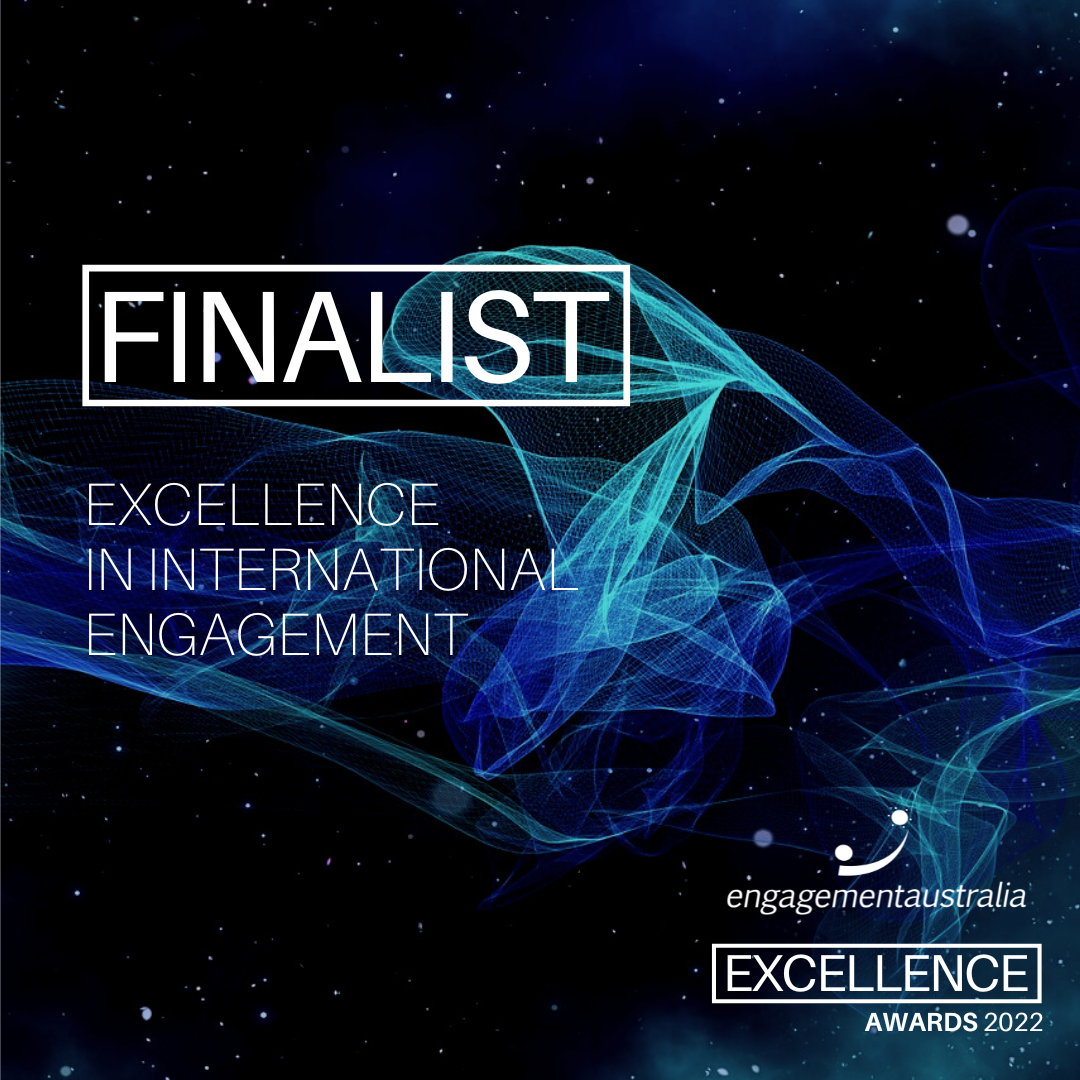
The Global Chinese Accounting Association: Enhancing Sino-Australian Relations through collaborative research, engagement and learning, Curtin University
The Global Chinese Accounting Association was established in Perth, Western Australia, in April 2018 as a global non-profit organisation. As an association for Chinese Accounting academics, students and professionals, it aims to foster international research linkages, strengthen industry connections and promote global education initiatives in the Accounting discipline. The Global Chinese Accounting Association, working with Curtin University and key professional bodies, has made significant advances in bringing people together, developing a profile and securing funding for engagement activities over the past four years. It has attracted a membership of over 2,000, including 73 universities, 6 accounting firms and 16 corporations.
Revitalising Informal Settlements and their Environments (RISE) Program, Monash University
Monash University’s Revitalising Informal Settlements and Their Environments (RISE) is a transdisciplinary, multi-year and multi-partner international action-research program that aims to transform human and environmental health in urban informal settlements through water-sensitive revitalisation. Working with communities, governments, local leaders and partner institutions, RISE aims to demonstrate through a randomised control trial (RCT) that a community co-designed, water-sensitive neighbourhood upgrade approach using nature-based solutions such as wetlands can deliver sustainable, cost-effective health and environmental improvements for those living in informal settlements. The RISE RCT involves 24 informal settlements home to more than 7,000 people in Suva, Fiji and Makassar, Indonesia
Globally-Minded Graduates: Supporting International Student Experiences in the Faculty of Engineering and IT, University of Melbourne
Since 2018 the Student Enrichment Team in the Faculty of Engineering and Information Technology (FEIT), University of Melbourne, has expanded its international student enrichment program to meaningfully engage students in intercultural experiences that cultivate a global worldview and better prepare graduates for a global work environment. FEIT’s holistic strategy encompasses: a) expanded opportunities for international internships; b) student-centred partnerships with global companies; c) access to the Project Global Citizen Program; and d) targeted engagement with international alumni. As a result, all FEIT students have access to a rich program of learning around intercultural collaboration and global citizenship.
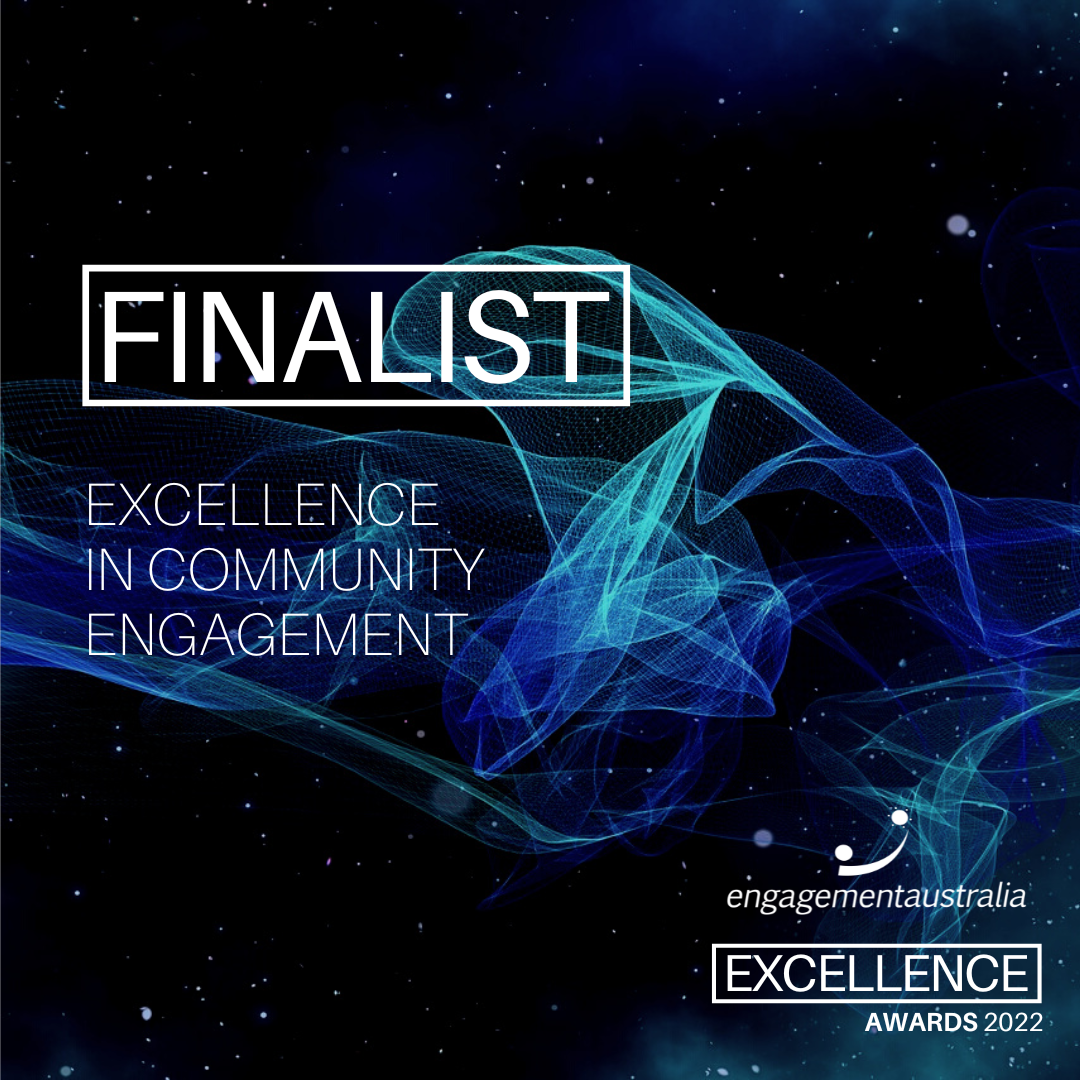
Blue Nile African Australian Masterclass Program, University of Melbourne
The Blue Nile African Australian Business Masterclass Program is a heavily subsidised and tailored program designed for African Australian entrepreneurs and leaders of not-for-profit organisations.
The program has been developed by the University of Melbourne in collaboration with the African Australian community to respond to the specific challenges faced by African Australian entrepreneurs in the Australian business landscape.
Participants engage with entrepreneurs, world-class staff executives, managers and community leaders, who share tools for growing their businesses and developing economic opportunities for the community at large.
Victoria Police Diversity Recruitment Program, Victoria University
Victoria University (VU), Victoria Police, Africause, and Jesuit Social Services (JSS) established the Victoria Police Diversity Recruitment Program to develop a more inclusive Victoria Police recruitment process.
During the two-year pilot program, several systemic barriers and cultural biases were removed to support African Australians complete recruitment with Victoria Police.
By July 2022, 131 participants completed the Program, 78 commenced the recruitment process, 54 passed the entrance exam, 20 were accepted into the Academy, and 16 graduated. The Program’s expansion to Culturally and Linguistically Diverse (CALD) and Aboriginal and Torres Strait Island communities is a testament to its success.
Sustainable Ecotourism - Binna Burra and Griffith University, Griffith University
Griffith University and the Binna Burra Foundation have worked together for decades, with activities relating to both environmental management and sustainable tourism. In September 2019, the devastating Queensland bushfires destroyed the EcoLodge, which had stood for nearly 80 years. Led by Foundation Chair Steve Noakes, an immediate recovery and rebuilding effort began. Griffith University reached out to Steve, and worked closely with Binna Burra Ecolodge on not just the rebuilding activity, but the development of a new and broader partnership. Binna Burra has emerged from the 2019 bushfire crisis stronger – and is now one of Australia’s largest ecotourism collectives.

A Deadly Solution: Combining Traditional Knowledge and Western Science for an Indigenous-led bushfood industry, The University of Queensland
This research empowers Traditional Owners and others in the Indigenous Bush Tucker industry to realise sustainable business profits while Traditional Knowledge is managed and protected, and communities benefit. Led by four Traditional Owner Communities, this project is discovering and developing the potential of bushfoods, drinks and ornamental plants, and uses technologies to enable and ensure Traditional Owners can sustainably develop business opportunities. The stand-out feature of this collaboration has been that it was the first in Australia to negotiate for Traditional Owner groups to retain their Intellectual Property within a Western legal framework.
Woort Koorliny: Australian Indigenous Employment Index 2022, Curtin University
Woort Koorliny: Australian Indigenous Employment Index 2022 is a collaborative project undertaken by the Minderoo Foundation’s Generation One initiative, the Bankwest Curtin Economics Centre, and Murawin.
The Indigenous Employment Index aims to identify, measure, and implement practices within large Australian-based organisations to increase and improve Indigenous employment outcomes. Following the launch of a National Report in May 2022, it provides the first comprehensive snapshot of Indigenous workplace representation and employee experiences. Ultimately, the Index seeks to amplify and privilege Indigenous voices to accelerate the journey to true employment parity for Indigenous Australians.
‘Baggarrook Yurrongi’ (Women’s Journey) – Improving the health of First Nations mothers and babies, La Trobe University
Strategies to improve outcomes for Australian First Nations mothers and babies are urgently needed. La Trobe University, in partnership with the Victorian Aboriginal Community Controlled Health Organisation and three tertiary hospitals in Melbourne, implemented and evaluated a major project called ‘Baggarrook Yurrongi’ where gold standard culturally safe continuity of midwifery care (which is associated with substantially better health outcomes) was implemented, and now strongly embedded. Over 700 women having a First Nations baby received the innovative program (compared with only 34 prior to the study). Key reasons for success were co-design, engagement and collaboration with First Nations people.

Professor Sarah Maddison - The Australian Centre Treaty Education Program, The University of Melbourne
The Australian Centre’s Treaty Education Program is the first executive education course of its kind, exploring how treaties function in relations between Indigenous and contemporary settler societies. As Victoria and other states prepare to enter treaty negotiations with First Nations, this timely course is educating stakeholders on the possibilities that treaties may open for future, and more just, relations between Indigenous and non-Indigenous peoples.
Professor Sarah Maddison, Director of the Australian Centre, is the driving force behind the success of the program. Professor Maddison has demonstrated outstanding leadership in engagement, building upon her long-standing connections with First Nations communities and engaging effectively with multiple state government departments, to deliver a cutting-edge educational program.
Danielle Harvey - UQ Art Museum Leadership in Engagement, University of Queensland
Danielle Harvey has demonstrated outstanding leadership in building engagement with diverse communities for UQ Art Museum, having established a nationally recognised Cultural Mediation program in her role of Senior Team Leader, Engagement and Training. Centred on empathy, inclusion, peer-to-peer learning, and wellbeing, Cultural Mediation is a practice that aims to remove unwelcoming barriers between UQ Art Museum and its visitors, including First Nations peoples, those living with disabilities, LGBTIQ+ and culturally and linguistically diverse community members. Since 2019, Danielle has led an innovative program that is unique amongst University Art Museums in Australia, leading to several external capacity-building partnerships.
Professor Lynette Russell AM, Monash University
Professor Lynette Russell, AM, FASSA, FAHA, ARC Laureate Fellow, has dedicated nearly three decades to Indigenous education, social justice and reconciliation. She is internationally renowned for pioneering new approaches to the field of history and significantly advanced our knowledge of Australian Indigenous History. Her sustained and distinguished record of innovative and creative scholarship has changed the way Aboriginal history is written, perceived, understood, and taught. As a champion of transdisciplinary research, she has built productive relationships across the higher education, museum, and policy sectors. Her exceptional leadership and mentorship have helped establish enduring partnerships between researchers and Indigenous communities.
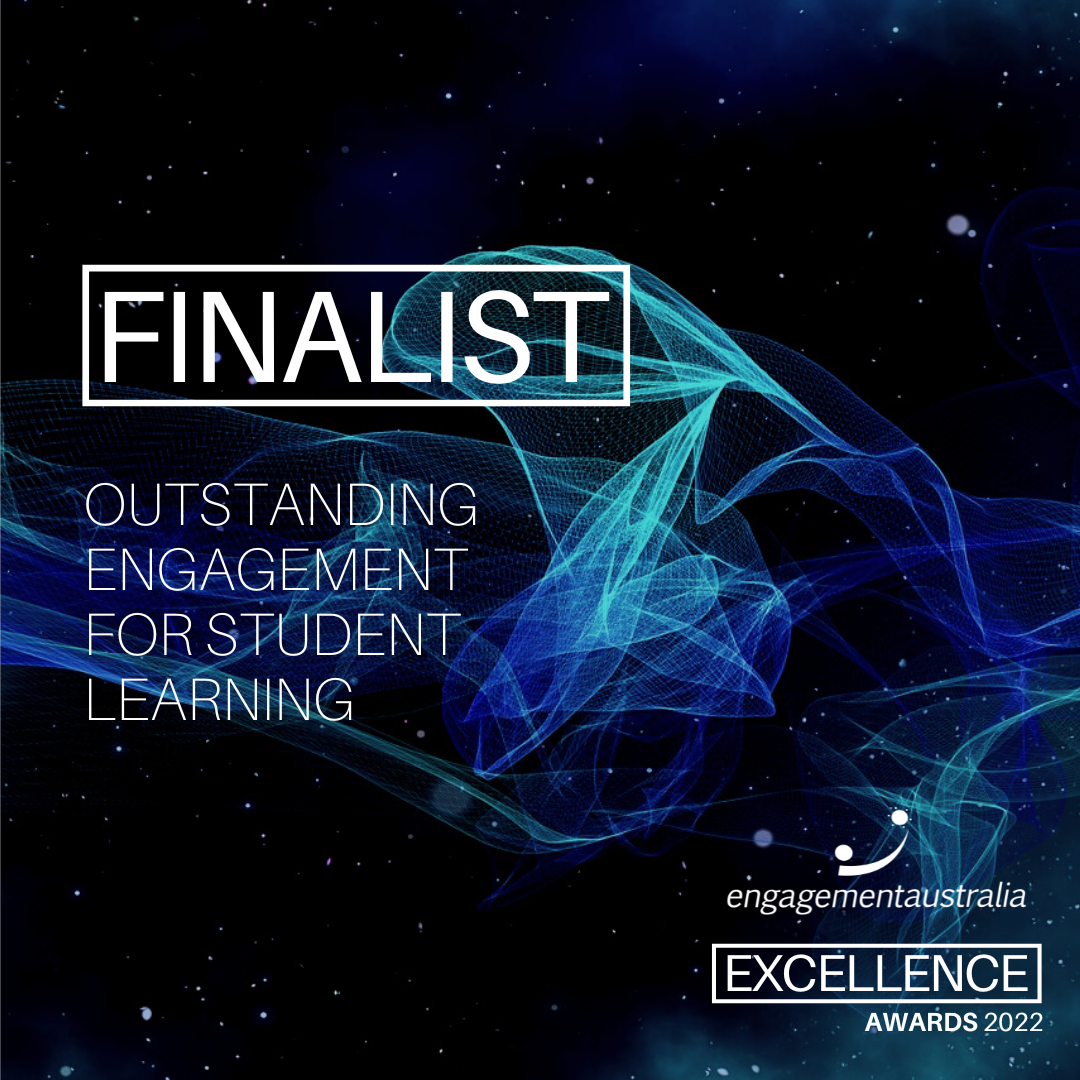
Medicine in Context, Western Sydney University
Medicine in Context is a sector leading example of the value of deeply embedded partnership in curriculum review, design, and delivery. The program clearly explored the reflective process that was undertaken to review, design and embed changes to curriculum that meet clear community need. There is evidence of strong connection to partners both through the design process and ongoing through student placements and teaching. Medicine in Context provides the type of learning our healthcare system and our diverse patients need right now – with understanding, respect, and support!
Monash Student Teams Initiative (MSTI), Monash University
The Monash Student Teams Initiative is a long-standing work integrated learning experience that provides comprehensive, multidisciplinary experiences for students with deep connection to industry. The resources, training and engagement opportunities provided to teams create an environment of high-performance collaboration and fosters professional development and student learning. The initiative demonstrates a multilayered approach to engagement with deep and lasting connection to industry partners, strong engagement with students over multiple years and connect and outreach into community that has inspired increased student participation in STEM.
UQ School of Music Indigenous-led learning, University of Queensland
The UQ School of music has drawn on the power of music as a vehicle for reconciliation, community engagement and deep learning for students, audiences and the broader community. This multi-year program of visiting Indigenous composers and large-scale student orchestral and choral performances created an environment in which understanding, and empathy were cultivated and students and were able to form deep connections with Indigenous stories and knowledges through music and language. This program is an exemplar for the sector.
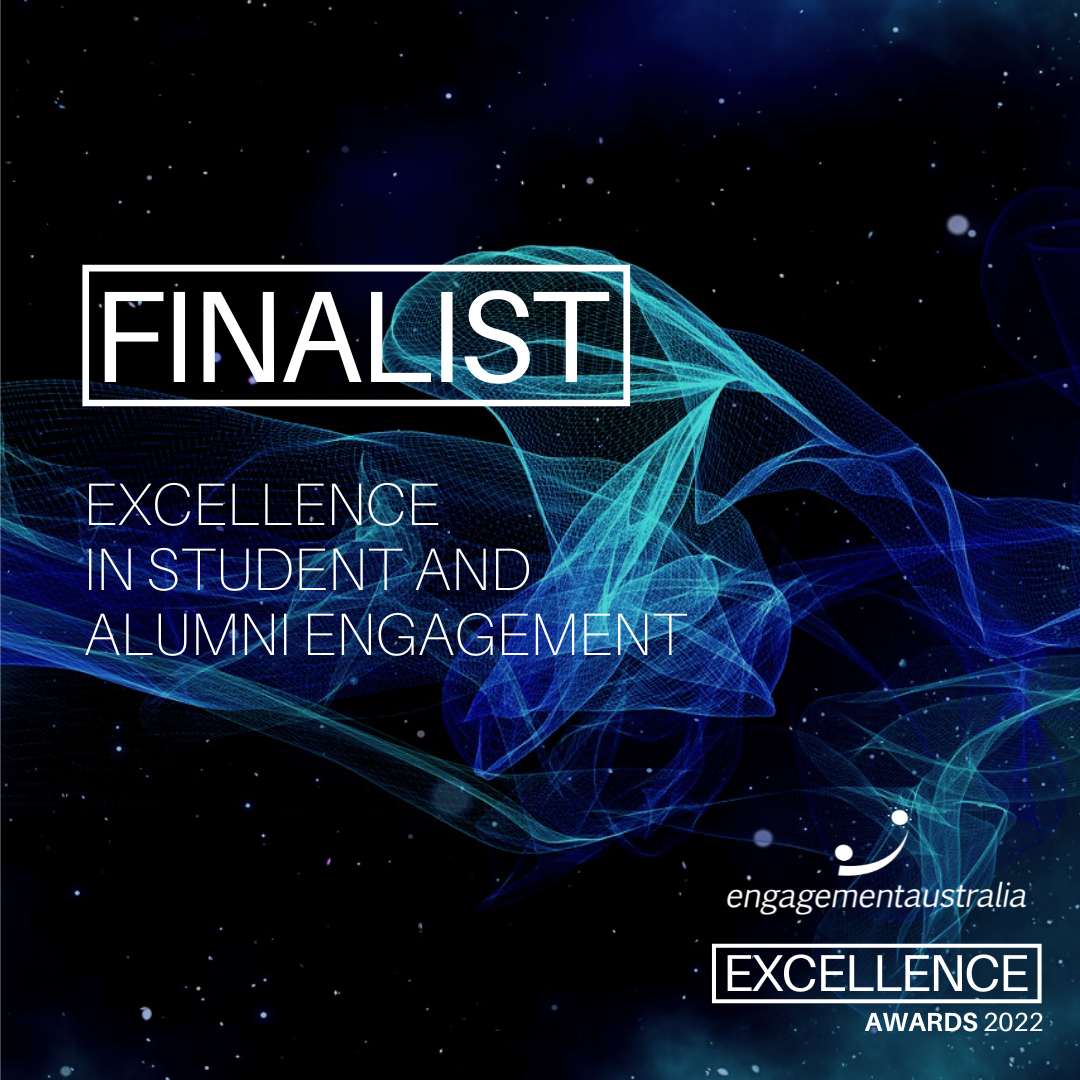
Engage Asia, The University of Sydney
Through strong partnerships with the Business School’s global industry and alumni network, Engage Asia students are mentored and supported as they work on cross-disciplinary projects to address the UN Sustainable Development Goals. What sets this program apart is the intentional way it has been designed to connect students from diverse backgrounds and disciplines which was particularly important during the pandemic. It is no surprise that students and partners all highly valued the experience and the benefits to students of critically applying their disciplinary knowledge and skills to addressing real-world challenges is not to be underestimated.
UQ Change Makers, University of Queensland
A sector leading example of alumni engagement, UQ Change Makers is a shining example of the importance of working in continued partnership with alumni to develop programs that meet their needs. Alumni voices are integrated into the design, planning and decision-making for the program, with the global board working alongside more than 50 alumni committees representing a diverse range of demographics and interest areas. By connecting the design of activities to student engagement and marketing initiatives, UQ Change makers is having a significant impact on student and alumni engagement. Providing global thought leadership events, mentoring and volunteering opportunities, and access to local and country based networking groups this program has delivered a 25% increase in alumni engagement.
Industry and Community Project Units and Alumni Partnership, University of Sydney
The Industry and Community Project Units is a unique opportunity for students to connect with CEO’s, c-suite executives, and senior managers from the University of Sydney alumni community to work on societal challenges such as ‘Building for a sustainable future’, ‘Creating wider access to higher education’ and ‘Reimagining social housing.’ Through this interdisciplinary project hundreds of students a year students gain real-world experiences and deepen their industry networks, understanding and global perspectives.
